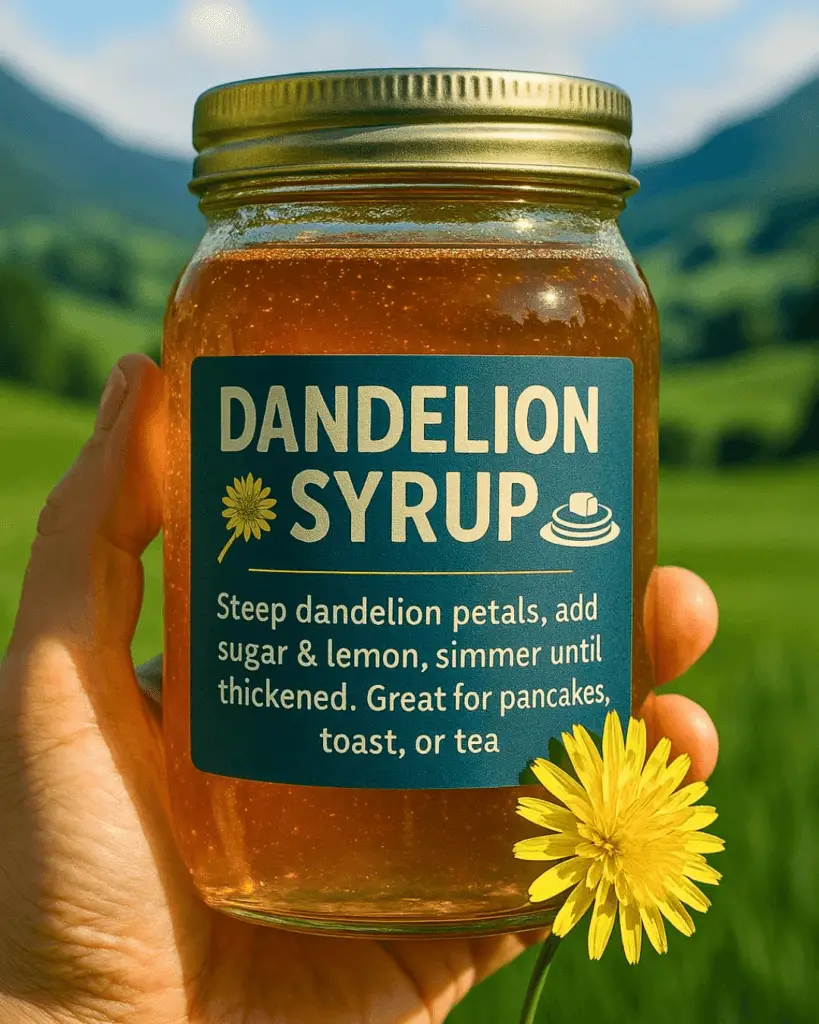Table of Contents
Dandelion syrup has become a popular choice for those looking to add a unique sweetness to their dishes. Made from the bright yellow blossoms of dandelions, this syrup offers a delightful flavor that pairs well with snacks and meals alike.
It serves as a natural sweetener that can enhance the taste of pancakes, waffles, and even tea.
Beyond its delicious flavor, dandelion syrup is packed with potential health benefits. Dandelions are known for their nutrients, and the syrup can provide a touch of nature’s goodness in daily diets.
Many enjoy it as a healthier alternative to refined sugars, making it a great addition to a balanced lifestyle.
Making dandelion syrup is an easy and rewarding process that allows anyone to tap into the beauty of spring. Picking fresh dandelion flowers is the first step toward creating this tasty and versatile syrup.
Once prepared, it opens up a world of culinary possibilities that are sure to impress friends and family.
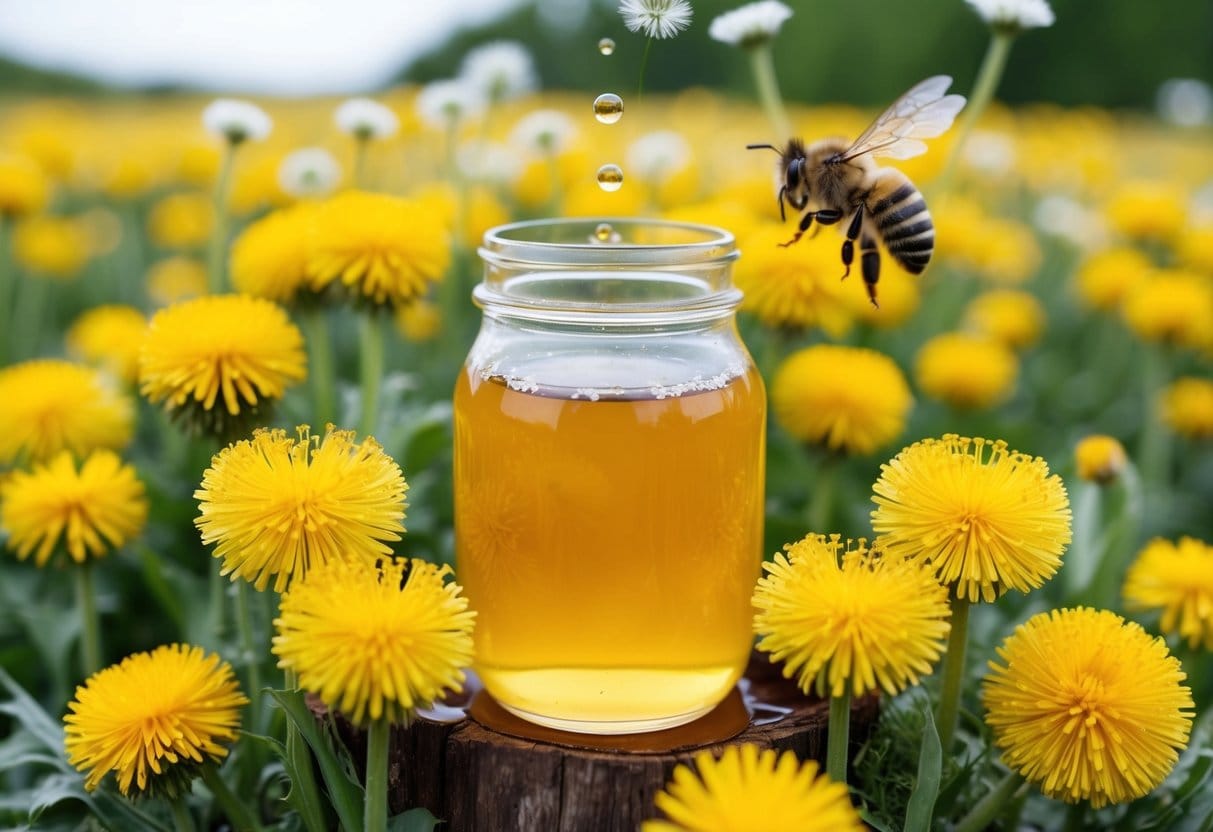
Key Takeaways
- Dandelion syrup is a natural sweetener that enhances various dishes.
- The syrup may offer health benefits due to the nutrients found in dandelions.
- Making dandelion syrup at home is simple and rewarding.
Dandelion Syrup Benefits and Uses
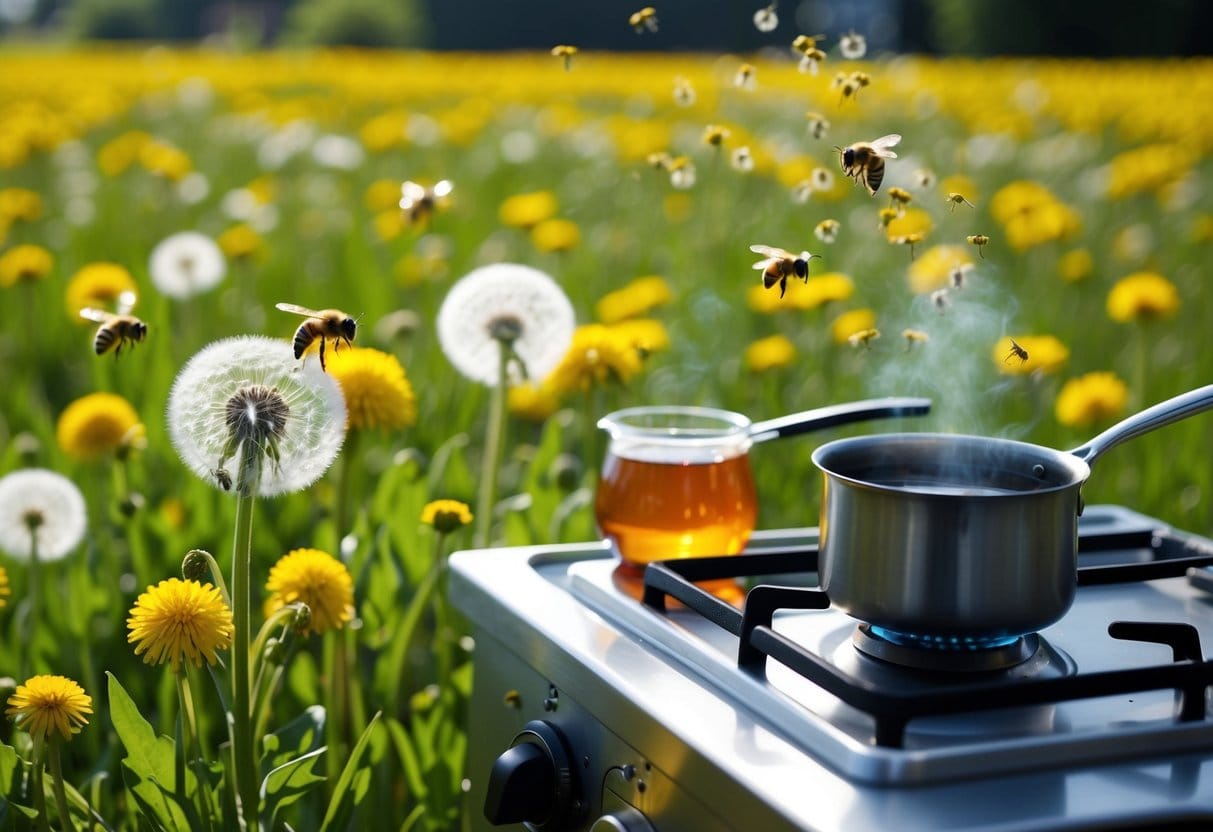
Dandelion syrup offers various benefits and uses, making it a valuable addition to both diets and home remedies. This syrup is derived from the dandelion plant’s flowers, which are rich in nutrients and have diverse culinary and medicinal applications.
Nutritional Profile
Dandelion syrup is packed with essential vitamins and minerals. It contains vitamins A, B, C, D, E, and K. These vitamins contribute to various body functions, including immune support and skin health.
Moreover, dandelions are high in antioxidants, which help combat oxidative stress. The nutritional content also includes minerals like potassium and calcium.
These nutrients are important for bone health and muscle function.
This syrup has low calorie content, making it a healthier alternative to traditional sweeteners. It can be enjoyed without the guilt of excess sugars.
Culinary Uses
Dandelion syrup can be used in various culinary applications. It serves as a natural sweetener, perfect for pancakes, waffles, and baked goods.
Many people enjoy adding it to tea or yogurt for an extra touch of flavor.
This syrup has a distinct floral taste that can enhance both sweet and savory dishes. It can also be used in salad dressings for a unique twist.
Dandelion syrup can replace honey in vegan recipes. It provides a similar texture and sweetness, making it a versatile ingredient in plant-based cooking.
Medicinal Properties
Dandelions have been valued for their medicinal properties for centuries. Dandelion syrup may support liver health, aiding in detoxification.
Some believe it helps in digestion and acts as a mild diuretic, promoting kidney function.
Additionally, the antioxidants in dandelion syrup can help reduce inflammation. This makes it a potential ally for joint health and reducing symptoms of arthritis.
While more research is needed, many people use dandelion syrup as a natural remedy for various ailments. Its benefits extend beyond nutrition, offering potential wellness support.
Creating Dandelion Syrup
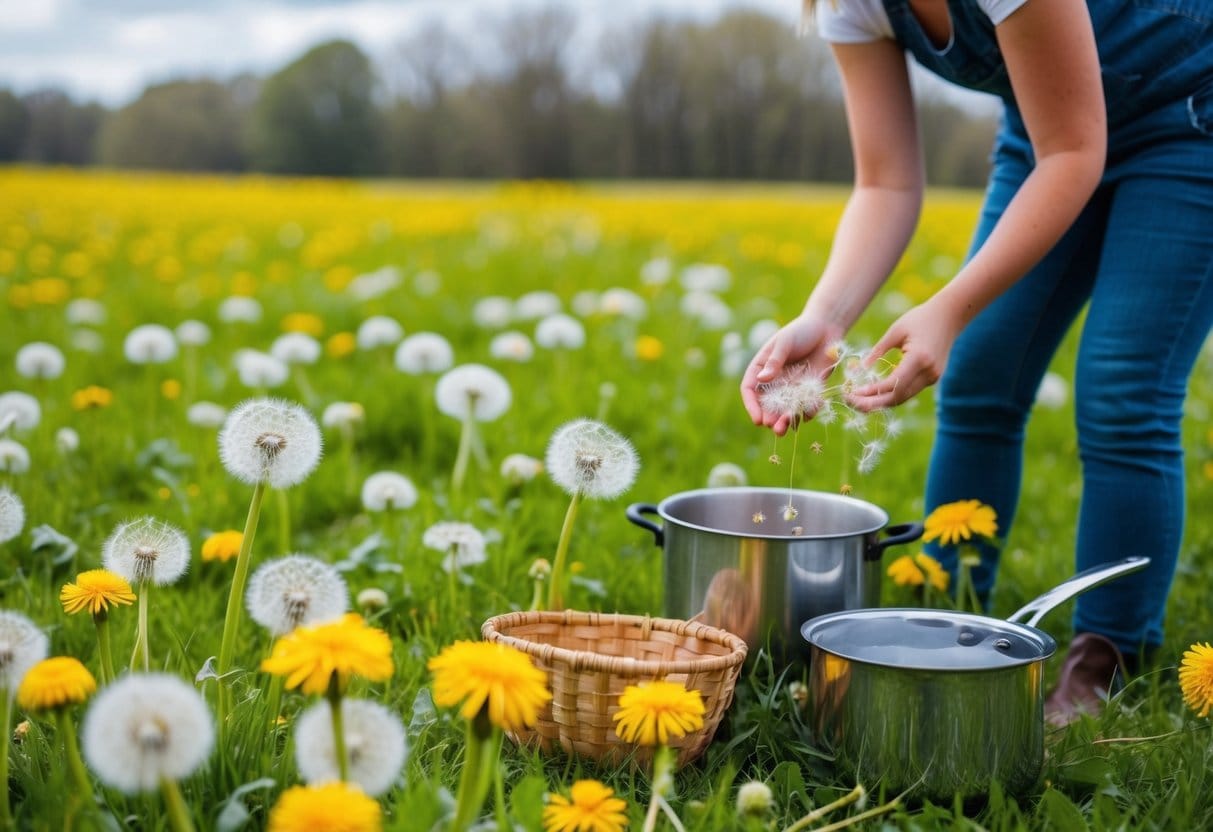
Making dandelion syrup involves a few essential steps. This process includes gathering the right ingredients, carefully preparing the mixture, and storing it properly for future use.
Ingredient Gathering
To make your own Dandelion Syrup 🌼🍯, start by collecting fresh dandelion flowers. Choose a sunny day when the blossoms are wide open.
For this recipe, you will need:
- 4 cups dandelion flowers
- 4 cups water
- 2 ½ cups sugar
- 2 tablespoons lemon juice
Make sure to pick only the yellow petals, discarding most of the green parts to avoid bitterness. Also, ensure the flowers haven’t been exposed to pesticides or pet traffic.
Preparation Steps
- Gently rinse the dandelion petals to remove any dirt or bugs.
- Simmer the petals in 4 cups of water for a few minutes.
- Remove from heat, cover, and let the mixture steep in the fridge for 24 hours.
- Strain the liquid using a fine mesh strainer or cheesecloth, pressing out as much juice as possible.
- Add 2 ½ cups of sugar and 2 tablespoons of lemon juice to the strained liquid.
- Stir the mixture over medium heat until the sugar fully dissolves.
- Simmer until the syrup thickens to your desired consistency.
- Let cool and pour into clean jars. Store in the refrigerator and enjoy on pancakes, toast, or in tea!
Preservation and Storage
Once prepared, pour the cooled syrup into sterilized glass jars.
Seal the jars tightly. When stored in the refrigerator, the syrup can last for 2 to 3 weeks. For longer storage, you can freeze it in ice cube trays.
These frozen cubes are convenient for sweetening drinks or desserts. As always, check for any signs of spoilage before using.
Frequently Asked Questions
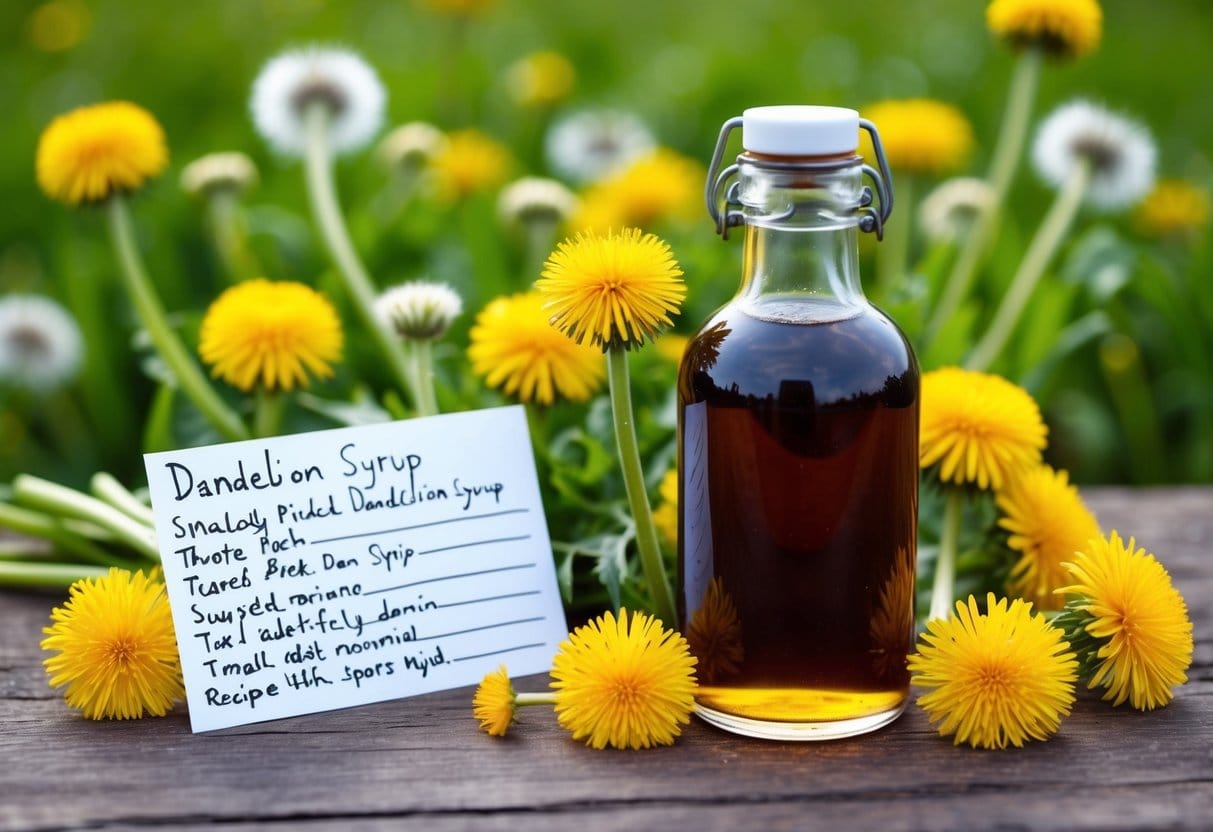
Dandelion syrup is gaining popularity for its unique flavor and potential health benefits. The following questions address common inquiries about making and using this syrup.
How can you make dandelion syrup at home?
To make dandelion syrup, gather yellow dandelion petals and simmer them in water. Let the mixture steep for 24 hours, then strain. Combine the liquid with sugar and lemon juice, and simmer until thickened. Store in a jar and enjoy!
What are the primary health benefits associated with dandelion syrup?
Dandelion syrup contains vitamins A, C, and K. It can support digestion and may help with inflammation. Some people also believe it can assist in detoxifying the liver, making it beneficial for overall health.
In what ways can dandelion syrup be used in cooking and mixology?
Dandelion syrup is versatile. It can be drizzled over pancakes, waffles, or yogurt. It also works well as a sweetener in tea and cocktails, adding a unique flavor to drinks.
What is the typical shelf life of homemade dandelion syrup when stored in a refrigerator?
When stored in the refrigerator, homemade dandelion syrup typically lasts about two to three weeks. Ensuring it is kept in a clean jar can help maintain its freshness for a longer period.
Are there any specific groups of people who should avoid consuming dandelion syrup?
Individuals with allergies to plants in the Asteraceae family should avoid dandelion syrup. Pregnant or breastfeeding women may also want to consult a healthcare provider before using it.
What are the distinctive flavor notes of dandelion syrup compared to other sweeteners?
Dandelion syrup has a unique taste that is often compared to honey. It offers floral and earthy notes. These can be more complex than traditional sweeteners. This makes it a delightful choice for recipes needing a distinct flavor.


